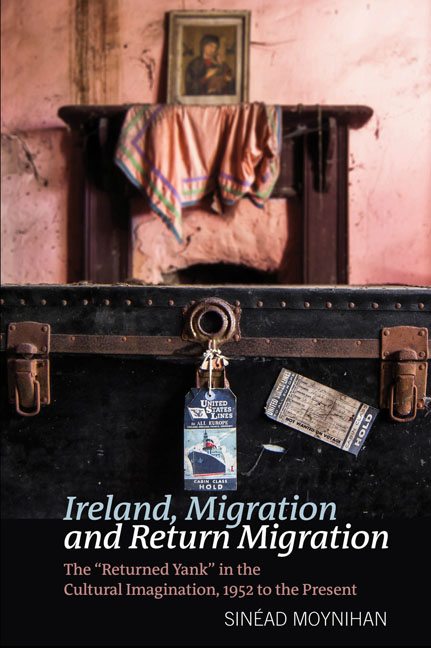 Ireland, Migration and Return Migration
Ireland, Migration and Return Migration Book contents
- Frontmatter
- Contents
- List of Figures
- Acknowledgements
- Introduction: ‘The Meanest Form of Animal’? The Returned Yank in the Cultural Imagination
- 1 ‘Quiet Men’: Film and Filmmaking in Returned Yank Fictions of the Troubles
- 2 ‘Mother Macree ad nauseam’: Maternity, Modernity and the Female Returned Yank
- 3 Erin’s Acres: The Returned Yank, Property Disputes and the Rise and Fall of the Irish Economy
- 4 ‘The Secret Dotted Line’: Return, Roots Journeys and Irish Literary Genealogies
- Coda: ‘We Are Where We Are’: Mythologies of Return and the Post-Celtic Tiger Moment
- Works Cited
- Index
Coda: ‘We Are Where We Are’: Mythologies of Return and the Post-Celtic Tiger Moment
- Frontmatter
- Contents
- List of Figures
- Acknowledgements
- Introduction: ‘The Meanest Form of Animal’? The Returned Yank in the Cultural Imagination
- 1 ‘Quiet Men’: Film and Filmmaking in Returned Yank Fictions of the Troubles
- 2 ‘Mother Macree ad nauseam’: Maternity, Modernity and the Female Returned Yank
- 3 Erin’s Acres: The Returned Yank, Property Disputes and the Rise and Fall of the Irish Economy
- 4 ‘The Secret Dotted Line’: Return, Roots Journeys and Irish Literary Genealogies
- Coda: ‘We Are Where We Are’: Mythologies of Return and the Post-Celtic Tiger Moment
- Works Cited
- Index
Summary
‘Parts of Brooklyn […] are just like Ireland.’
Colm Tóibín, Brooklyn (2009)‘Do we not have enough already? Enough money, enough shops, enough to be doing already, without you running about opening another bloody business?’
Kate Kerrigan, City of Hope (2011)For some time, the most oft-repeated refrain of the recent recession (2008–2013) in Ireland, reiterated by politicians and economists and satirised by Irish-American songwriter Paddy Cullivan, was ‘We are where we are.’ Irish Times journalist Kevin Courtney even cited it, alongside ‘Gleeks’ and ‘wiki-leaks,’ as one of the most ‘enduring catchphrase[s]’ of 2010. As Colin Coulter notes, the use of the collective noun was one of the most effective tropes of Ireland's economic crisis and represented ‘an attempt to manufacture a sense of collective experience and interest that does not in fact exist.’ The familiar incantation, ‘We are where we are,’ in particular, was ‘central to the ideological strategy to establish that the austerity measures implemented by the Irish government, while unpalatable, were necessary and indeed simply unavoidable.’ For me, the sound bite is also striking for the extent to which it contains both spatial and temporal resonances. ‘We are where we are’ in both time (post-boom) and space (a small, relatively vulnerable and isolated, Atlantic-facing country). It also captures appropriately the dramatic scale of the reversal from boom to bust. For if ‘We are where we are’ implies stasis in both time and space, the Celtic Tiger years were characterised by vertiginous economic, social and cultural transformation resulting in what Fintan O’Toole terms ‘uncertainties of both space and time’ that made it hard for Irish people to be quite sure ‘where they were living, and when.’ In his book analysing the causes of Ireland's recession, Ship of Fools: How Stupidity and Corruption Sank the Celtic Tiger (2009), O’Toole argues that the pace of change during the Celtic Tiger years – ‘rapid urbanisation, multiculturalism, the need to make one's way in a polyglot and physically unfamiliar society’ – led to ‘a recapitulation’ of the experiences of many Irish people's own forebears ‘when they emigrated from rural farms to huge metropolitan centres in the US or Britain.’
- Type
- Chapter
- Information
- Ireland, Migration and Return MigrationThe 'Returned Yank' in the Cultural Imagination, 1952 to the present, pp. 219 - 248Publisher: Liverpool University PressPrint publication year: 2019


